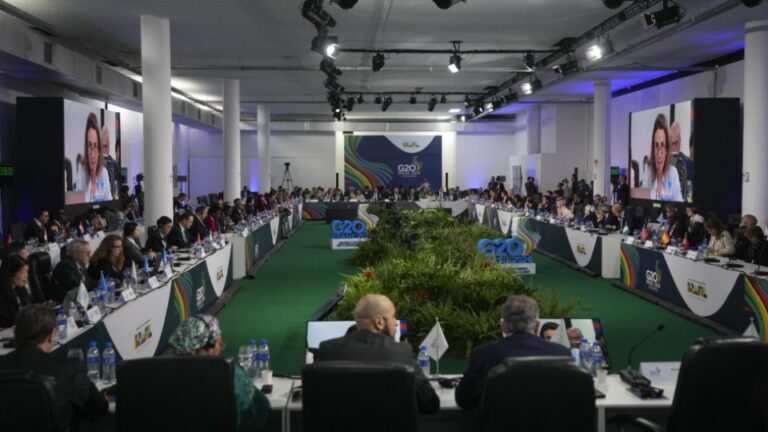Finance chiefs from developed and emerging economies failed to issue a joint statement Thursday amid disagreements over Russia's war in Ukraine and the Hamas-Israel conflict.
Russia's invasion of Ukraine exposed deep divisions within the G20 between Russia and China on the one hand, and Western countries that have imposed sanctions on Russia on the other.
Brazil, which holds this year's G20 Presidency, issued a Chairman's Summary concluding two days of talks, saying in a footnote that the financial forum was not the appropriate place to discuss geopolitical issues.
This is not the first time the group has failed to issue a joint statement, although Treasury secretaries did so after reaching an agreement at their previous meeting last year.

G20 finance ministers and central bank governors will meet in São Paulo, Brazil, on February 29, 2024. (AP News/Kyodo News)
Masato Kanda, Vice Minister of International Finance, said at a press conference that “a number of countries strongly condemned the Russian invasion and Hamas' terrorist attacks (against Israel), and expressed concern about the alarming humanitarian crisis in the Gaza Strip.'' Ta.
“Given the serious negative impact that Russia's invasion of Ukraine will have on the global economy, Japan believes that this issue should be addressed at the G20,'' he said. Mr. Kanda attended the meeting on behalf of Finance Minister Shunichi Suzuki, who came to Japan for parliamentary deliberations.
In addition to disagreements over geopolitics, G20 finance ministers and central bank governors believe the global economy is heading for a “soft landing,” meaning a recession is likely to be avoided, Kanda said. It was said that they matched.
The Chairman's summary pointed to war, conflict, economic fragmentation, and protectionism as downside risks to the economy. He maintained existing commitments regarding foreign exchange rates.
Despite slowing growth, the global economy has so far avoided a recession that had been feared due to aggressive interest rate hikes in major economies such as the United States and the euro zone, and the real estate crisis in China.
The G20 stressed that exchange rates should reflect economic fundamentals, noting that unstable and disorderly movements have a negative impact on the global economy.
Brazil has prioritized fighting inequality and building a sustainable and just world.
Brazil's Finance Secretary Fernando Haddad called for fairer taxes on the ultra-wealthy at a meeting of finance secretaries.
The group consists of seven countries: the United Kingdom, Canada, Germany, France, Italy, Japan, the United States, and the European Union, as well as Brazil, Russia, China, India, and Saudi Arabia.


